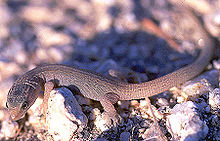Xantusia
| Xantusia | |
|---|---|

| |
| Xantusia vigilis | |
| Scientific classification | |
| Domain: | Eukaryota |
| Kingdom: | Animalia |
| Phylum: | Chordata |
| Class: | Reptilia |
| Order: | Squamata |
| Family: | Xantusiidae |
| Subfamily: | Xantusiinae |
| Genus: | Xantusia Baird, 1859[1] |
Xantusia (/zænˈtuːziə/) is one of three genera of night lizards (family Xantusiidae). Species of Xantusia are small to medium-sized, viviparous (live-bearing) lizards found in the U.S. Southwest and in northern Mexico.
These lizards display morphological adaptations to specific microhabitats.[2] They occupy rock crevices and decaying plants. Rock dwellers generally have brighter coloration, longer limbs and digits, and larger size than plant dwellers, which are generally duller, smaller, and have shorter limbs.
Species of the genus Xantusia are remarkably disjunct, with populations scattered throughout the deserts and mountains of the far western borderlands with only a handful of recorded cases of interspecific allopatry. The genus contains at least seven distinct cases of morphological convergence to the rock dwelling ecomorph in Arizona, California, Baja California, and Central Mexico.[3]
Taxonomy and etymology[edit]
The names and descriptions of the genus Xantusia and the type species X. vigilis were published in 1859 by Spencer Fullerton Baird, the generic name commemorating the naturalist John Xantus.[1][4]
Based on the most current phylogenetic analyses of Xantusiid lizards, The earliest-diverging species of the genus is Xantusia riversiana. Sister to this species are two clades: the X. vigilis species complex, and the southern Xantusia. The X. vigilis species complex is made up of X. vigilis, X. arizonae, X. sierrae, X. bezyi, X. wigginsi, and its most recent addition X. jaycolei.[5] The Southern Xantusia contains X. gilberti, X. sherbrookii, X. gracilis, X. henshawi, X. bolsonae, X. extorris, and X. sanchezi.
Species[edit]
The following is a list of species in the genus.[1]
- Xantusia arizonae Klauber, 1931 – Arizona night lizard
- Xantusia bezyi Papenfuss, Macey & J.A. Schulte, 2001 – Bezy's night lizard
- Xantusia bolsonae Webb, 1970 – bolsón night lizard
- Xantusia extorris Webb, 1965 – Durango night lizard
- Xantusia gilberti Van Denburgh, 1895 – Gilbert's night lizard
- Xantusia gracilis Grismer & Galvan, 1986 – sandstone night lizard
- Xantusia henshawi Stejneger, 1893 – granite night lizard
- Xantusia jaycolei R. Bezy, K. Bezy & Bolles, 2008
- Xantusia riversiana Cope, 1883 – island night lizard
- Xantusia sanchezi R. Bezy & Flores-Villela, 1999 – Sanchez's night lizard
- Xantusia sherbrookei R. Bezy, K. Bezy & Bolles, 2008
- Xantusia sierrae R. Bezy, 1967 – sierra night lizard
- Xantusia vigilis Baird, 1859 – desert night lizard
- Xantusia wigginsi Savage, 1952 – Wiggins's desert night lizard
References[edit]
- ^ a b c Xantusia vigilis at the Reptarium.cz Reptile Database
- ^ Bezy, R. L. (1967). "Variation, distribution, and taxonomic status of the Arizona night lizard (Xantusia arizonae)". Copeia, 653–661.
- ^ Noonan, B. P., Pramuk, J. B., Bezy, R. L., Sinclair, E. A., de Queiroz, K., & Sites Jr, J. W. (2013). "Phylogenetic relationships within the lizard clade Xantusiidae: Using trees and divergence times to address evolutionary questions at multiple levels". Molecular Phylogenetics and Evolution, 69(1), 109–122.
- ^ Beolens, Bo; Watkins, Michael; Grayson, Michael (2011). The Eponym Dictionary of Reptiles. Baltimore: Johns Hopkins University Press. xiii + 296 pp. ISBN 978-1-4214-0135-5. (Genus Xantusia, p. 291).
- ^ Leavitt, D. H., Bezy, R. L., Crandall, K. A., & Sites Jr, J. W. (2007). "Multi locus DNA sequence data reveal a history of deep cryptic vicariance and habitat driven convergence in the desert night lizard Xantusia vigilis species complex (Squamata: Xantusiidae)". Molecular Ecology 16(21). 44554481.
Further reading[edit]
- Baird SF (1859). "Description of New Genera and Species of North American Lizards in the Museum of the Smithsonian Institution". Proceedings of the Academy of Natural Sciences of Philadelphia 10: 253–246. (Xantusia, new genus, p. 255).
- Boulenger GA (1885). Catalogue of the Lizards in the British Museum (Natural History). Volume II ... Xantusiidæ ... London: Trustees of the British Museum (Natural History). (Taylor and Francis, printers). xiii + 497 pp. + Plates I-XXIV. (Genus Xantusia, p. 327).
- Stebbins RC (2003). A Field Guide to Western Reptiles and Amphibians, Third Edition. The Peterson Field Guide Series ®. Boston and New York: Houghton Mifflin Company. xiii + 533 pp. ISBN 978-0-395-98272-3. (Genus Xantusia, pp. 305–306).
